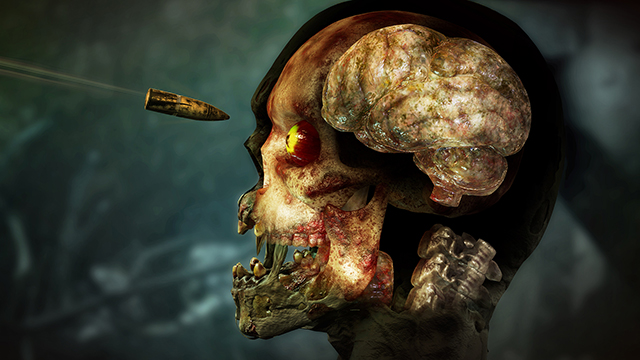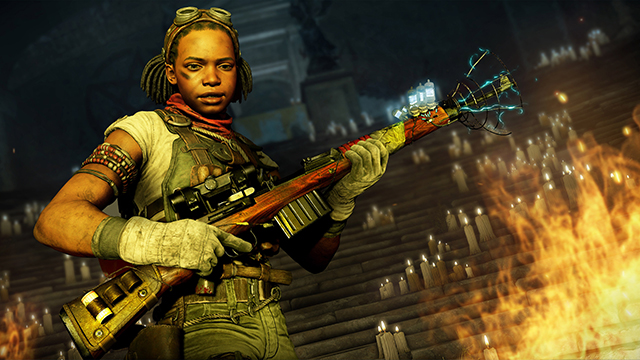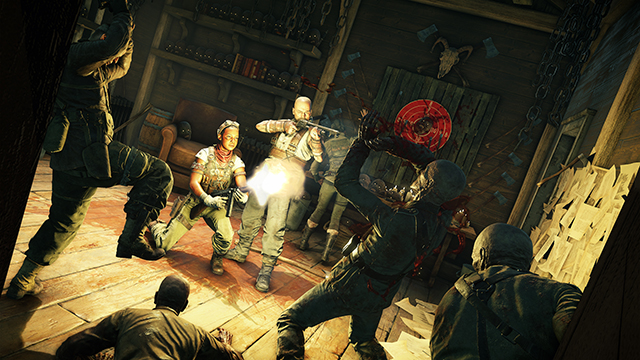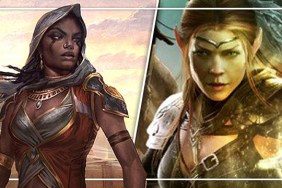Rebellion has been chugging along since 1992, making games from Strange Brigade, Sniper Elite, and two different Aliens Vs. Predator titles. And unlike most other big, longstanding studios, Rebellion is still independent. In addition to recently playing Zombie Army 4: Dead War, the team’s next game, we also sat down with Head of Creative at Rebellion Tim Jones and Lead Level Designer Jordan Woodward to speak about that independence as well as the team’s love of co-op, how the studio relates to B movies, and more.
GameRevolution: How is moving between Zombie Army, Strange Brigade, and Sniper Elite? Is it refreshing to always be changing it up?
Jordan Woodward: We have a luxury that we have some really established franchise with some strong hardcore fanbases as well. Internally, because it isn’t a gigantic studio, we have a lot of experience on different teams such as the Strange Brigade team and the Sniper Elite team that come together and make Zombie Army 4.
Specifically, I can talk about the level design team where there are a lot of level designers who worked on Strange Brigade and a lot of level designers who, including myself, worked on Sniper Elite 4. That knowledge and experience comes together to make Zombie Army 4. So you get that kind of wealth of experience crossing over and influencing the game but also trying to do a service to the Zombie Army fans at the same time. We try to keep the core but build on it through our other franchises and experiences.

Tim Jones: We’re always working on multiple games at any one time at Rebellion. There are always a bunch of different things going on, which is exciting for the studio in general but also for different teams as they can move from one game to another depending on our development needs.
I certainly remember working on Strange Brigade and a lot of games prior to that were serious in tone but Strange Brigade was an opportunity for us to embrace the goofy. It was the whole part of the point and really refreshing for us and it was exciting to see how well received it was by everybody. It gave us license to explore some of the more goofy gameplay elements of Zombie Army 4 that we might not have otherwise done.
Zombie Army Trilogy has its goofy elements but we felt comfortable adding stuff like electric fist attacks, divine grenades, and other elements. It still feels fitting for the game and the universe that we’ve got but it amps up the fun.
Woodward: We also have the luxury of having our own engine. So we have Asura, our own internally developed game engine and we can share tech fairly easily across the projects. So the bullet cam, for instance, came from Sniper Elite 4. So we have a lot of groundwork already laid in our other franchises and having our own game engine allows us to share that tech quite nicely. Every game we make gradually builds on our tech and goes into all of the games that we make.

GameRevolution: Strange Brigade and Zombie Army are geared toward cooperative play so what draws you all to make games with co-op at the forefront?
Jones: It’s something that I think we’ve gravitated towards quite instinctively. And we found that our players obviously really appreciate it. There is something nice about not having a competitive edge. I mean, there is a competitive edge where you’re still comparing scores but it’s a market that feels underserved in games, which is a shame but good for us since we are making them. There’s just a joy of playing together and fighting against a common enemy and being able to help each other along. Seeing cooperative behavior is more rewarding to see than trying to kill each other, which is well served.
Woodward: By that same token, there’s this kind of fun banter where you could get your friends killed so you could get a higher score. We have that in the game so it’s slightly competitive where you’re all friends but you can screw them over just a little bit, even though it’s fun to work together.
GameRevolution: So do you think it is bred from the industry’s movement into more multiplayer-centric games?
Jones: Maybe to an extent but I think it is important to remember that in spite of all the noise and talk of everyone being online and multiplayer being the end all and be all, the fact is that single-player experiences are important to a huge portion of the audience, not just ourselves.
I like single-player experiences. I play Zombie Army by myself as much as I do with other people. And the same is true [for our players], given the data we have. Just as many play in single-player as they do in multiplayer. People enjoy playing on their own without the pressure of having to perform for anyone else. We’re not about to start jettisoning that part anytime soon.

GameRevolution: Rebellion’s games tend to have some sort of pulpy center that has a lot in common with independent or B movies. And the price of the games usually reflect that and help feed into the team’s name and underdog status. Is that a conscious choice to make your games consistent with that perception?
Woodward: Definitely being an independent studio is really important for the culture Rebellion. As a development team, everyone gets a say. The culture of Rebellion is very indie, even though it’s a big company. And that’s a really nice way to make a game. I think that comes across in the games we make as well. People has described as underdogs and I really like that. Nowadays, it is really rare to be independent as a developer and still be quite a big developer. I don’t see that changing. It seems at the heart of Rebellion to stay independent and that’s a really good thing.
Jones: It’s not really something you can play for. You are what you are. We’re just making the best games we can in the way we happen to make them. And we are excited that we get increasing numbers of millions of people wanting to play our games. That’s OK, right? It’s sort of on purpose but it’s kind of what just comes out.







